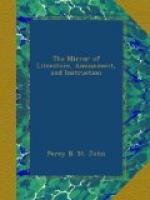William Morrison, after discharging his duty so manfully, was permitted to go on shore the same evening, to visit his friends; and, indeed, the captain could not have known before that he belonged to the place, as he surely would not have confided to the lad so unpopular a task as that of kidnapping his own relations and acquaintances. He was landed at the point of Scarlough, to prevent the necessity of going through the streets, which might have been dangerous in the excited state of the people’s minds; and, stretching across the fields, and along the side of the hill, he steered steadily on in the direction of his paternal home, which was about a mile and a half from the Point, but only one mile from the town. The moon had now risen, but was only visible in short glimpses through the clouds that were hurrying across the sky; and the tall, strange shadows of the willows and yews that skirted the churchyard, appearing and disappearing as he passed, probably by recalling the associations of his earlier years, made William shrink, and almost tremble. His own shadow, however, was a more pleasing thing to look at. The dress, which, grown familiar by usage, he would not have noticed elsewhere, was here brilliantly contrasted in his recollection with the more clownish and common garb of his boyhood—for he already reckoned himself a man; and the dagger, projecting smartly from his belted side, gave, in his opinion, a finish quite melodramatic to his air. He drew out the tiny blade from its sheath, and its sparkle in the moonlight seemed to be reflected in his eyes as he gazed on it from hilt to point; but the expression of those eyes was changed as they discovered that its polish in one place was dimmed by blood. This could easily be accounted for by the affray on the beach—and at any other time and place it would have been thought nothing of;—but at this moment, and on this spot, he was as much startled by the sight, as if his conscience had accused him of a deliberate murder. The impressions his mind had received while passing the churchyard, now returned upon him with added gloom; a kind of misgiving came over him; and a thousand boding thoughts haunted him like spirits, and hanging, as it were, on his heart, dragged it down farther and farther at every step. He bitterly regretted that he had not remained in the boat, as he had at first resolved, a neutral spectator of the strife. How did he know that his hand had not been raised against the life of his own brother? As far as he could see or learn, indeed, no fatal accident had occurred; but there have been instances of people walking cheerily off the field of battle, and dying of their wounds after all. And yet it was not likely—it was hardly possible—that John could have been in the affray, his indentures protecting him from the impress. These cogitations were speedily followed by others of as gloomy a character; for the thoughts breed faster than we can perceive them, and each multiplies after his kind. It




